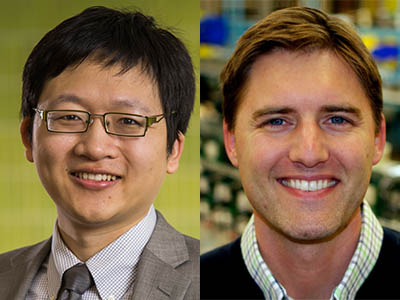Two of five projects selected for the “Campus as a Lab” award involve research on energy technologies, led by four investigators from the Andlinger Center. Minjie Chen, assistant professor of electrical engineering and the Andlinger Center for Energy and the Environment, and Darren Hammell, a Gerhard R. Andlinger Visiting Fellow in Energy and the Environment, were awarded funding to build and test a nanogrid on campus, with which they will simulate scenarios of deep renewables penetration. Lynn Loo, director of the Andlinger Center for Energy and the Environment and Theodora D. ’78 and William H. Walton III ’74 Professor in Engineering, with chemical and biological engineering undergraduate Matthew Marquardt, received the award to execute a demonstration project on campus that will advance solar-powered smart windows.
These funded research projects will use the University’s grounds as a laboratory or testbed for the exploration of technologies or practices that enhance sustainability and environmental responsibility. The campus serves as a real-world setting where ideas and theories can be tried on a small scale, with the goal of scaling up successful projects beyond campus. These projects were highlighted in the story, “Five projects will explore sustainability using the Princeton campus as a laboratory” and are excerpted below.
Adding renewables to the electrical grid

Photos by David Kelly Crow and Princeton Power Systems
To meet the challenge of including renewable energy sources such as wind and solar to the electrical grid — the network of power stations and lines that deliver electricity to homes and businesses — a team of researchers will build a prototype grid to allow experimentation on ways to coordinate electricity from renewable and non-renewable sources. Solar and wind energy production fluctuates widely depending on weather and time of day. An electric grid with a large percentage of renewable integration may become highly unstable if not coordinated correctly.
The research team, led by Minjie Chen, assistant professor of electrical engineering and the Andlinger Center for Energy and the Environment, and Darren Hammell, the Gerhard R. Andlinger Visiting Fellow in Energy and the Environment, will test ways to incorporate solar, wind, battery and other sources of power by building a testing environment called the Andlinger Distributed Energy and Power Testbed (ADEPT). The testbed will be highly programmable to allow the team to explore various configurations of power supplies as well as spikes in power usage, such as the greater demand posed from charging electric vehicles. The project will also explore innovations in how to meet spikes in user demand, such as programming the grid to autonomously cluster into “micro-grids” to defend against cyberattacks or natural hazards, and using smart technologies to enhance grid stability.
Field-testing solar-powered smart windows

Photo by David Kelly Crow
A new smart-window technology that uses solar power to darken or lighten window glass — which saves energy by reducing the need for heating and cooling indoor spaces — will be tested this summer on buildings around campus. The technology involves coating windows with a film of flexible, transparent solar cells that convert sunlight into electrical energy to drive the change in transparency. Developed in the laboratory of Lynn Loo, director of the Andlinger Center for Energy and the Environment and the Theodora D. ’78 and William H. Walton III ’74 Professor in Engineering, these organic photovoltaic cells could power smart windows without the need for an external electrical power supply, allowing this technology to address retrofits and upgrades of existing windows.
To determine how these solar-powered smart windows perform in real-world situations, undergraduate Matthew Marquardt, Class of 2021, will install and evaluate them in campus buildings. In collaboration with engineers at Andluca Technologies, a startup founded by members of the Loo group, Marquardt will design hardware to monitor and control the solar cells via the internet of things, integrate the solar cells with smart windows, and develop software to optimize the energy savings and benefit to occupants.
For full coverage of the Campus as a Lab award recipients, see the story on the Princeton University homepage.